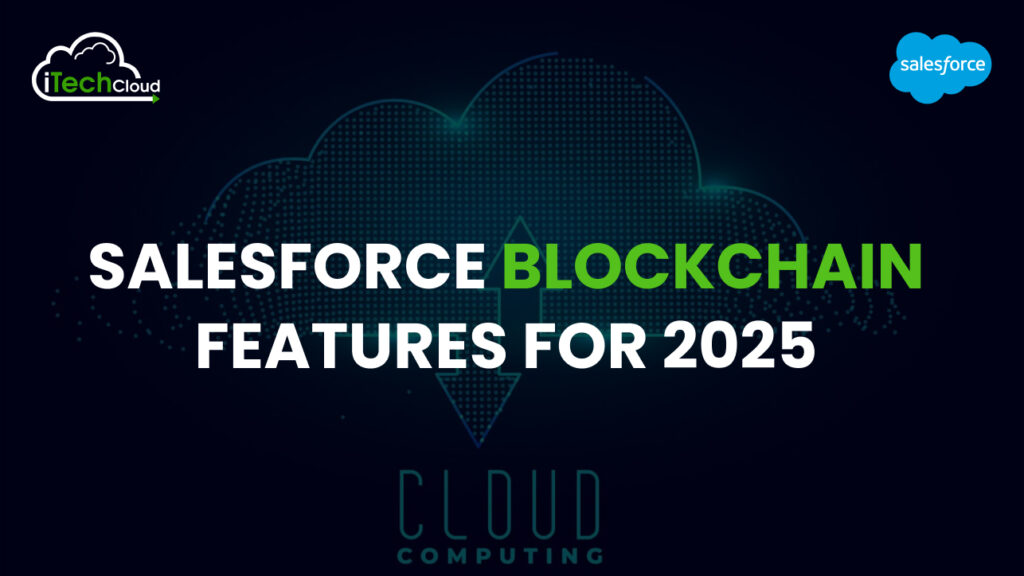Salesforce Blockchain Features for 2025

Salesforce integration of blockchain technology is poised to transform customer relationship management (CRM) by improving data security, transparency, and efficiency. By 2025, Salesforce plans to use blockchain to create decentralized, tamper-proof systems that simplify business operations and build trust among stakeholders.
Table of Contents
What is Salesforce Blockchain?
Salesforce Blockchain is a low-code platform designed to help organizations build, manage, and integrate blockchain networks for secure and transparent data sharing. It enables businesses to create decentralized systems where multiple stakeholders can collaborate, verify, and access data in real time. By combining blockchain technology with Salesforce’s CRM capabilities, it enhances trust, efficiency, and transparency in business operations and processes.
Key Features of Salesforce Blockchain in 2025
Salesforce Blockchain is a platform that enables businesses to build and manage blockchain networks, applications, and smart contracts seamlessly within the Salesforce ecosystem. By integrating blockchain technology, organizations can enhance data security, transparency, and operational efficiency.
The key features of Salesforce Blockchain include:
1. Decentralized Data Architecture for Security
Traditional databases often centralize data, making them susceptible to breaches and unauthorized alterations. Salesforce Blockchain employs a decentralized architecture, distributing data across multiple nodes. This design ensures that records are immutable and securely verified, as any change requires consensus from the entire network. Cryptographic techniques further safeguard each transaction, maintaining data integrity and preventing
2. Real-time, Transparent Audits
Blockchain inherent transparency allows for instant, verifiable audit trails. With every transaction recorded on an immutable ledger, Salesforce Blockchain enables businesses to conduct real-time audits without the need for third-party verification. This feature is particularly beneficial in industries with stringent compliance requirements, facilitating efficient and accurate auditing processes.
3. Smart Contract Automation
A standout feature of Salesforce Blockchain is its support for smart contracts—self-executing contracts with terms directly written into code. These contracts automate business processes by enforcing predefined rules and actions, reducing human error and operational delays. For instance, smart contracts can automate approval workflows, order fulfillment, or financial settlements, streamlining operations and enhancing efficiency.
4. Data Interoperability Across Partners
Salesforce Blockchain facilitates secure and efficient data interoperability among partners without compromising security or data integrity. This capability allows companies to manage shared ledgers, ensuring all parties have consistent and accurate information, which fosters trust and collaboration.
5. Data Ownership and Privacy
Salesforce Blockchain supports decentralized identity management, granting individuals control over their personal data while ensuring privacy. Features like zero-knowledge proofs allow businesses to verify information without exposing sensitive data, which is essential for sectors such as healthcare and financial services where data privacy is paramount.
6. Supply Chain Visibility and Provenance Tracking
Salesforce Blockchain provides a tamper-proof ledger that records every step in the supply chain, from raw material sourcing to product delivery. This transparency enables businesses to track product provenance, ensure regulatory compliance, and improve inventory forecasting accuracy, thereby enhancing overall supply chain management.
7. Secure Identity Verification and KYC Processes
Blockchain technology simplifies and strengthens Know Your Customer (KYC) processes. With Salesforce Blockchain, businesses can establish a decentralized, verifiable identity management system that secures customer data while expediting the onboarding process, making it faster, more secure, and cost-effective.
8. Data Sharing in Healthcare
Salesforce Blockchain enables healthcare providers to share patient data securely on a decentralized network, ensuring compliance with regulations like HIPAA while improving care coordination and treatment outcomes.
9. Automated Insurance Claims Processing
The insurance industry often faces slow claims processing due to manual checks and multiple party involvement. By utilizing smart contracts on Salesforce Blockchain, insurers can automate claims settlement processes, triggering payouts when specific conditions are met without human intervention. This automation reduces fraud, decreases processing time, and enhances customer satisfaction.
10. Integration with Salesforce Low-Code Platform
Salesforce low-code platform allows users to develop applications with minimal coding, enhancing productivity and innovation. Integrating blockchain capabilities into this platform enables businesses to create custom blockchain applications and smart contracts efficiently, leveraging visual development environments and drag-and-drop interfaces.
Conclusion:
Salesforce Blockchain in 2025 represents a paradigm shift in how businesses manage data, trust, and collaboration. By leveraging its decentralized architecture, enhanced transparency, and robust smart contract capabilities, organizations can transform complex workflows into streamlined, secure processes. The platform’s seamless integration within the Salesforce ecosystem ensures businesses can adopt blockchain technology without technical hurdles, empowering them to innovate while maintaining operational efficiency.

